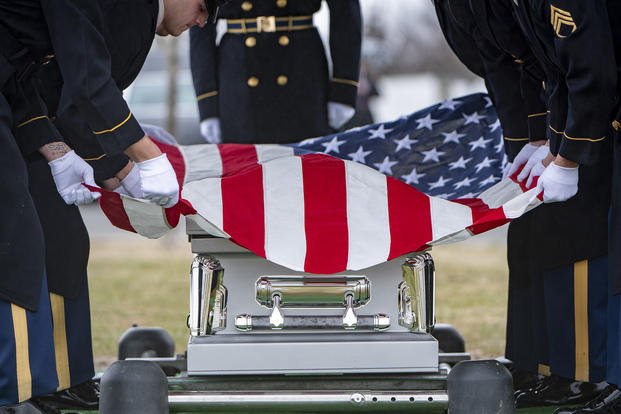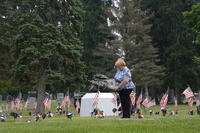There are several types of survivor assistance available for military families. Here we describe and explain a few of them.
Casualty Assistance Officer (CAO)
Each branch of service has officers who serve as with Casualty Assistance. Although they go by different titles - Casualty Assistance Officer (Army), Casualty Assistance Representative (Air Force), Casualty Assistance Calls Officer (Navy, Marines, and Coast Guard) - their jobs are the same. Casualty Assistance Officers are responsible for notifying family members when a service member has died. A CAO will provide as much information as available regarding the circumstances of the member's death and will answer any questions. The CAO will also ensure that the survivors immediate needs are being met during this difficult time. The CAO will immediately begin the process of providing any assistance available in making funeral or memorial arrangements as appropriate.
The CAO will assist beneficiaries in the preparation and submission of claims to various government agencies for benefits to which you may be entitled. In addition, the Personnel Command will provide the CAO with a Casualty Assistance Call Package for the next of kin. This package will contain various benefit forms. CAO will provide assistance all claims are filed and settled or until any issues regarding those benefits are resolved. The next of kin may choose to release the CAO at any time that he or she feels that their assistance is no longer needed or desired.
Casualty Notification
Casualty notification to the next of kin of an individual who has been reported as a casualty will be accomplished in a timely, professional, dignified and understanding manner. Notification is accomplished in different ways depending upon the type of casualty and circumstances surrounding the incident. Notification in death and missing cases is always accomplished in person, by a uniformed service representative; however, if there is a chance that the next of kin may learn of the casualty by other than official sources, notification will be made by the quickest means, normally the telephone.
Chaplains
The immediacy of losing a loved one is usually a paralyzing moment. You might feel totally shocked and immobilized. Your mind struggles to think rationally as your inner self cries out in pain.
You may want to talk with someone. It can be helpful to share your feelings and grieving. You may have a need for prayer, spiritual counsel, or information about funeral services, memorials, or other religious observances. Chaplains represent various religious traditions and they're prepared to offer assistance. They want to listen. . . they care about ministering to you at this time.
Your local chaplains understand. They have dedicated themselves to providing ministry in times of need. If this is your time of need, you can contact a chaplain during duty hours at the chapel. If there is no answer at the chapel - any day, any time - contact the "duty chaplain" by calling your local base telephone operator, Command Post, Hospital/clinic emergency room, or the Security Forces Desk.
Primary Next of Kin (PNOK)
For most of us, the term "next of kin" means more than one person. It may mean a person's spouse and children, or it may extend to a person's parents and siblings as well. When the military refers to a next of kin, the term PNOK is used to identify one person who will receive notification of the death of the service member and from whom the military will request instructions for the transportation, preparation and interment of the deceased.
The PNOK will also receive the member's personal effects in most cases. The designated PNOK is in order of precedence: that is, the first living survivor highest on the following list:
- Member's surviving spouse.
- If there is no spouse, then the eldest child over the age of 18 including those by prior marriage.
- If there are no children over the age of 18, then father or mother of the deceased.
- If there are no parents, then the eldest brother or sister or other blood relatives.
This system for determining PNOK will be used unless legal exclusive (sole) custody of the member had previously been granted to a person outside this order of precedence by reason of a court decree or statutory provision.
Dependents
Dependents are those persons whose relationship with and reliance on the deceased member for support entitled them to certain benefits while he or she was alive, and who, upon his or her death, become entitled to new benefits. Generally, dependents include the member's surviving spouse, children (natural, adopted, or illegitimate) under age 18, unmarried children over age 18 who, before they reached age 18, became unable to care for themselves, children between the age 18 and 23 who are attending a Veterans Administration-approved school, and parents who depended on the deceased member for at least half of their financial support.
Beneficiaries
Beneficiaries are those persons who are entitled, either as a result of a prior election by the member or by operation of law, to receive certain death benefits, including, but not limited to, life insurance proceeds, dependency and indemnity compensation, unpaid compensation, Social Security benefits, and reimbursement of veterans education assistance plan contributions. Generally, the beneficiary is the person(s) whom the member designated on his/her DD Form 93, commonly referred to as a "Page 2" and located in the Member's service record.
Guardianship in the Case of Minor Beneficiaries
If the member is survived by a child who has not yet reached the age of majority, as established by the laws of the state where the child lives, and who has been designated by the member as a beneficiary to receive monetary benefits and or is entitled to personal property, a guardian must be appointed to handle the affairs of the minor's estate. This must be done even when the child is in the care of a surviving natural or adoptive parent. A guardian is appointed by the court to protect the interests of the minor child. The focus in these situations is on the handling of money and property on behalf of the child as opposed to the other issues of raising the deceased service member's child.
There are two types of guardianship with which you may need to be familiar. The first is the natural guardian. Most states have by law, established an amount of money (anywhere between $3000 to $10,000) which, if the total monies/property to be paid to the child is less than that amount, the natural parent may act as a natural guardian. If applicable to your case your CACO will provide you with an appropriate Natural Guardian Affidavit. If a natural or adoptive parent is granted guardianship, payment may be made to the guardian when all of the following conditions exists:
- Another legal guardian has not been appointed.
- The parent has custody of the minor child.
- All state requirements for payment of monies/property on behalf of the minor have been met. Your CACO will help you look into those requirements.
- The parent has submitted a notarized Natural Guardian Affidavit, which identifies the state law involved and the reason for payment to the parent, and which indicates the parent's understanding of the requirements of the state law.
The second type of guardianship is the legal guardian. If the amount of monies/property is more than the amount specified by the state having jurisdiction over the child, a court-appointed legal guardian who may also be a natural or adoptive parent must represent the child's interests. The difference in this case is that the person who is to act in that capacity must petition the state court for appointment as the child's legal guardian.
The military cannot recommend or engage the services of a private attorney to help you establish legal guardianship for a minor's estate. Your CACO will help you contact the nearest military legal service office for information and referral. Report of Casualty (DD Form 1300) One of the most important forms you will receive from the CACO will be the Report of Casualty (DD Form 1300). As the next of kin or beneficiary, you may use the DD Form 1300 to show proof of death to government and commercial agencies that pay benefits to survivors of eligible service members. The DD Form 1300 contains information on the service member's identification, background, active service, pay, interested persons, and casualty information.
Want to Know More About the Military?
Be sure to get the latest news about the U.S. military, as well as critical info about how to join and all the benefits of service. Subscribe to Military.com and receive customized updates delivered straight to your inbox.










